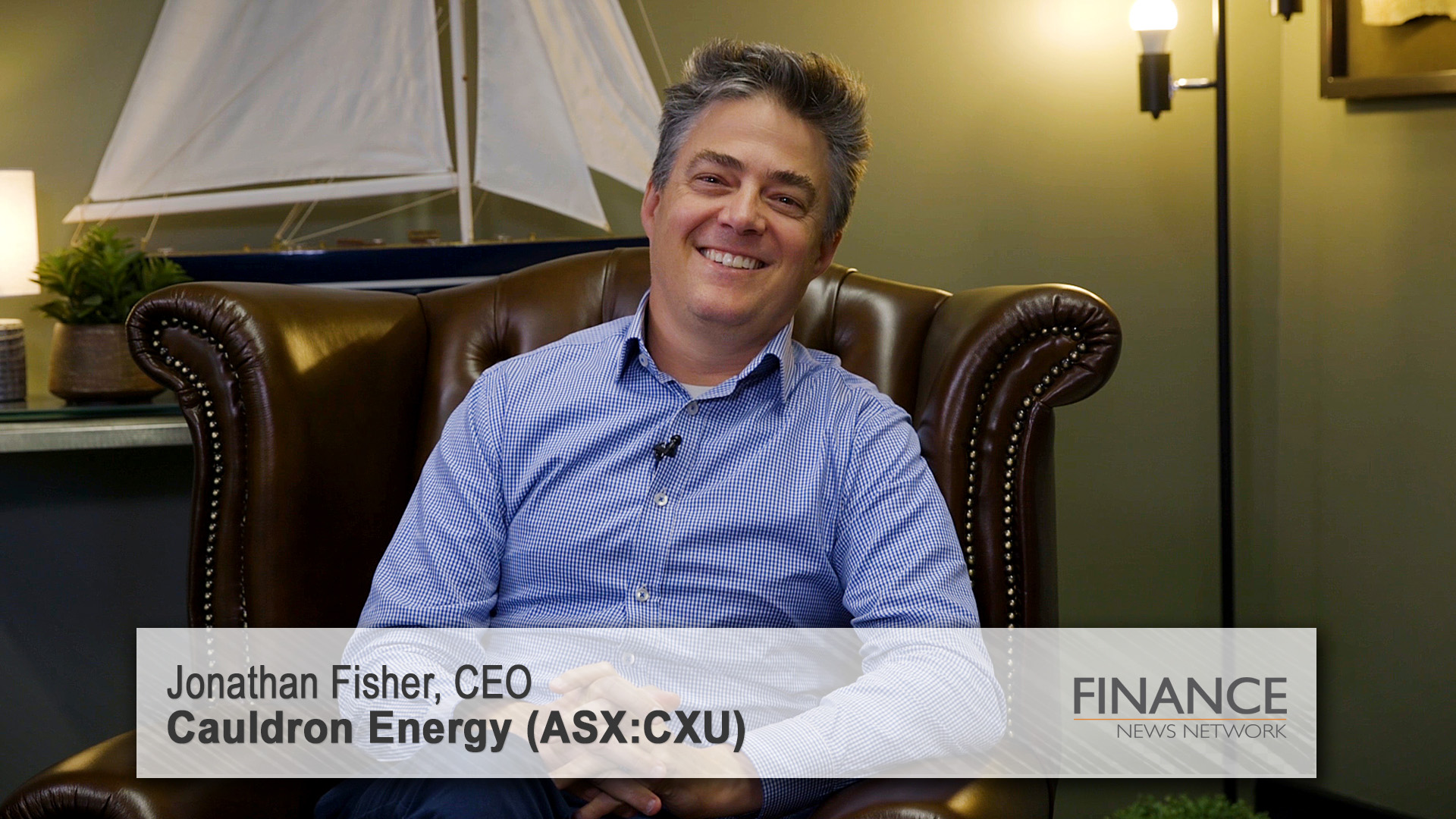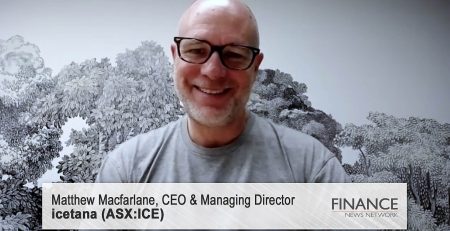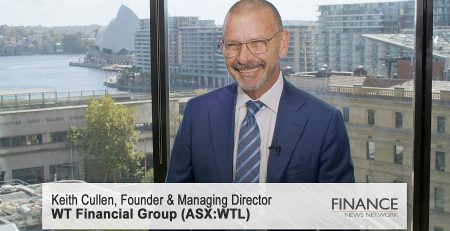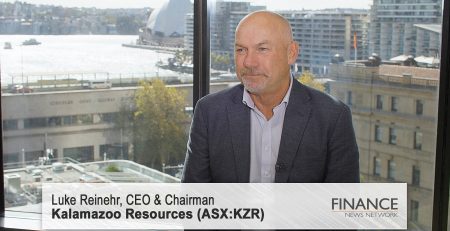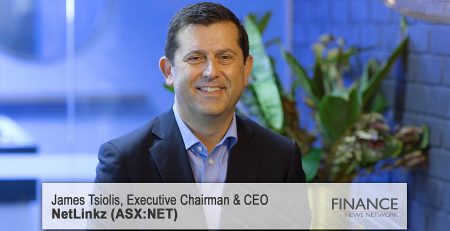Uranium market dynamics: Insights from Cauldron Energy’s CEO Jonathan Fisher
Paul Sanger: I'm Paul Sanger for the Finance News Network, and today I have the pleasure of speaking with Jonathan Fisher, CEO of Cauldron Energy, an ASX listed uranium company. Jonathan is highly respected among the Australian investors for his deep knowledge, insightful perspectives, and clear understanding of the significant role that nuclear power plays in decarbonization. Jono, welcome to the network.
Jonathan Fisher: Thanks, Paul. Thanks for the kind words. A bit overstated, but happy to take them.
Paul Sanger: Now, Jono. Let's get straight into it. I've got you in here today. Overnight, there was significant news out the US regarding uranium. The US government has enacted a ban on Russian uranium imports. Can we kick off by you providing us some insights into this decision and its obvious implications?
Jonathan Fisher: Yeah, so this ban has been a long time coming. It passed the house probably three months ago, has been stalled in the Senate by Senator Ted Cruz. It's all part of trying to defund the Russian war machine in response to the invasion of Ukraine. And the US has put in place a whole lot of sanctions across a whole lot of stuff, but to date had avoided anything to do with uranium or nuclear fuel, frankly, because it's really difficult to run the western nuclear fleet, excluding Russia and specifically not Russian uranium, but Russian enriched uranium or fuel sources. But they've finally done that. Last week, President Biden threatened to implement the ban under executive order anyways, that unblocked the Senate and it got through last night.
Paul Sanger: And given that US nuclear power plants predominantly rely on Russia for, I think, about 12% of the uranium needs, what impact do you foresee this ban having on the global uranium market?
Jonathan Fisher: 12% of the uranium coming from Russia, but 25 ish percent of fuel sources, so enriched assembled fuel sources. So they're a huge supplier into the US market. And it is going to be very complicated the way all this flows through. Net positive for western countries and western suppliers like Australia. But just bear in mind, the way that the flows happen is extremely complicated. A couple of things that'll happen is everyone's reactors will find their fuel, but the way that the uranium and the fuel flows through the global system will change. So some stuff will then now go to China and the stuff that's going to China will go to the US for example. That creates more friction and it will increase price. But I think the biggest impact we're going to see immediately is that, as I mentioned, this ban has been sitting there for a few months.
What that's meant is people haven't wanted to trade in spot or utilities haven't wanted to really contract because they wouldn't want to contract for a fuel and then realize that a few months later it's banned. So everyone's been staying out of the market. You've seen uranium drop from $110 ish down to about $85, $86. With this certainty, people will now be able to plan and you'll see more demand and trading coming back into you, and that'll push price up. It's already back up to about $93.
Paul Sanger: You said it took three months really for this to come to fruition. So clearly, thought has gone into it. The market has obviously sat back and have been waiting for these events. It's going to be very interesting how the next days and weeks, how this business all plays out.
Jonathan Fisher: Yeah, there are a few interesting parts in the ban. There's a transitional arrangement out to 2028 where certain utilities, if they're in trouble, are allowed to import lower and rich uranium from Russian sources if they get an exemption. The reason they've chosen 2028 is because actually the US has got some more domestic enriching and fuel capacity coming online in 2028. So the US has thought about that and said, "Well, okay, we'll have this transition arrangement to 2028. If you are a sort of game playing person, you might think Mr. Putin would not be too pleased with being gamed like that and say, "You know what? Transition arrangement out. Let's cut off supply today." If that happens, that would be a black swan market discontinuity event because without any possibility for transition arrangements, you'd expect there'd be a few Western utilities that'd be a bit freaked and scrambling for supply, which would push up the price. And in fact, a couple of commentators, I'd say, would probably go, "No bid."
Paul Sanger: And let's be honest, past Putin behavior would suggest that this wouldn't be an unfathomable event. You would expect a reaction. So we better watch that space closely.
Jonathan Fisher: Yeah. And he plays hardball. The Russians have been a leading supplier in nuclear fuel. It's one of the things that they've clearly led the world on in the last couple of decades. So this will be a hit to them and let's see how they respond.
Paul Sanger: Let's watch that space. Let's just shift the focus now to Cauldron Energy. How do you think this news might affect your company?
Jonathan Fisher: Well, everyone knows by now, probably I'm leading the charge to change the uranium ban in WA. And I think this is really fundamental for it because what it shows, and it'll show the WA government, is that bifurcation in the nuclear market is here to stay. If the US and EU and the rest of the people they will have consulted before implementing this, if everyone was intending to go back to the status quo in a year or two, they wouldn't go to this trouble. So bifurcation is long-term, and that means that throughout the value chain, a fuel assembly, enrichment conversion, and all the way back to uranium mining, people are looking to secure that from politically aligned nations. And so therefore, uranium supply from first world jurisdictions such as Australia becomes all the more important in the long term.
Paul Sanger: You answered my next question. Considering the ban, do you believe there'll be increased pressure on the WA government to reconsider the uranium ban?
Jonathan Fisher: So this is just the latest in a whole string of positive factors saying this ban needs to be revisited. There's fundamental economics. There's helping our global partners decarbonize. We've got a moral obligation to do that. The golden goose of iron ore is cooked in WA and the government's going to need funding. So this is just the latest, and I think the WA government will need to take a real hard look at it.
Paul Sanger: And from a timeframe perspective, I know, how long is a piece of string, but if they do have a change of heart, how quickly could that be triggered?
Jonathan Fisher: They can change that policy very quickly because it is, to be clear, a policy of the party, not a legislative ban. So it can be done very quickly. And we are not the most advanced of the WA projects. There are others that are actually in development works, but for us, on news of that ban and lifting and frankly, our share price going through the roof, we would be doubling, tripling down on expenditure to accelerate our pre-development works to get into production.
Paul Sanger: And in the broader context, how significant would the removal of the WA mining ban be for allies reliant on uranium for nuclear energy?
Jonathan Fisher: It's interesting because the biggest producer globally, is Kazakhstan, roughly 50% of the world market, a little bit under, and the Kazakhstani major producer, which is Kazatomprom, has been absolutely marketing to the world over the last few months while this ban has been mooted but stalled that, "They're not Russia, they're not Russia. Hey, you know, we are Western friendly too," not wanting to be cut out of that market. But parts of the market see through that and a lot of the Kazakhstani production is actually tied up in JVs with Kazatomprom or through Russian conversion and enrichment contracts. So there is that issue there. So Australia has the world's largest uranium resources, and WA has a good chunk of it. A lot of it does sit at Olympic Dam in South Australia, but WA has got big resources, and from a jurisdictional perspective, there's no reason why WA itself can't be in the top two or three producers globally. And 15, 20 million pounds plus is not out of the question in the longer term. So very significant, WA could supply 10%, 15% of the world's market.
Paul Sanger: And just to say that the WA does lift that ban, how swiftly could Cauldron Energy move to initiate uranium production?
Jonathan Fisher: So we would be very swiftly raising some outsized funds to go and accelerate works. We've delivered a cracking scoping study. We've got a big exploration target, which I'm actually going drill in the next few weeks. We've probably got a few years of finalizing. So we've done the scoping study, but got to finalize a feasibility study, do all the other pre-development works before we get into production. But it would be a transformational event for the company, that's for sure.
Paul Sanger: And there's no doubt a queue of people looking to knock at your door to help you finance that acceleration.
Jonathan Fisher: Yeah, absolutely. Yeah. Capital raising hasn't been an issue for us. We recently did a premium to market placement, which everyone seemed to like, but people are there because you've got the uranium market, which is probably the one commodity market, which is still really positive at the moment. And because of this discontinuity of the potential of a WA policy change, there are outsized returns there possible. There's risk associated with it, yes. The smart money says there's no doubt the policy changes. The question is how long it takes.
Paul Sanger: And just to finish up, obviously, we talked that uranium's been on a bit of a charge, had a pullback recently, which you've talked. We're now seeing some results come out for some of the producers, and I'd love to get your thoughts. Cameco results came out and there was a mix of views on those results. Can you talk to me, why was that?
Jonathan Fisher: Yeah. The whole market's scratching heads at that one. Cameco reported Tuesday night Aussie time, and Cameco is in a difficult position because they were obviously very large and they maintained production through the down cycle in uranium. And they've done that by contracting. So they're now stuck with a forward order book where they have basically zero exposure to upside in pricing.
Paul Sanger: Like gold hedging.
Jonathan Fisher: Yeah, essentially. In fact, Cameco has been buying spot at 87 bucks and selling it back into their contracts at 57. So they're negatively exposed to prices at the moment. So that's hard for Cameco. That's a negative for Cameco itself, and they trade off pretty hard. But for the rest of the market, again, mixed bag. You saw Cameco's production out of North America, out of the Canadian assets, like McArthur River to be quite strong. So they say they're going to hit their 2024 guidance, but they've also got a Kazakhstani JV that's operated by Kazatomprom. And actually those numbers were pretty weak. And the market's like that because they're saying, "Okay, well the reasons that Kazatomprom's JV with Cameco were weak with things like sulfuric acid, well, that's applicable across Kazakhstan's portfolio."
So people are starting to say, "Okay, well let's apply this across Kazatomprom for 2024. And you've got Kaz numbers coming up in a little while, and people are starting to think, "Well, those numbers are not going to be looking very good." And then to add icing on the cake, Kazatomprom CEO came out and said, "You know what? We've got no interest in increasing production." For multiple years, he said that. So given that they're such a substantial producer, that suggests the market that you're not going to have a flood of new pounds coming in from Kaz.
Paul Sanger: Jonathan, absolute pleasure to have you in here today.
Jonathan Fisher: Always fun. Thanks, mate.
Ends.
Copyright 2024 – Finance News Network
Source: Finance News Network

